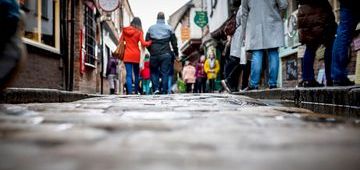Can you tell us what your role is and where you work?
I’m a Lecturer in the Pharmacy Department at the University of Reading. My role is quite varied, I teach Pharmacy and Physician Associates students on topics relating to public health, substance misuse and communication skills, and supervise research projects. I’m also the Co-chair of the Staff Disability Network, and work with others to improve the working lives of disabled staff at the University. My research involves co-producing and testing alcohol interventions in low and high- resource settings. I’m currently co-leading a study in Nepal (Chitwan), to investigate how community assets (including the arts, culture, heritage sites, green spaces, community associations and volunteer groups) could be harnessed to reduce alcohol harm. I’m also leading an interdisciplinary research to understand how the physical and social spaces within community pharmacies, the most accessed health space we have, are experienced by pharmacy service users and staff, so the findings can be used to optimise these spaces.
I don’t have a typical day; it depends on the day of the week or term time. During this Covid-19 pandemic I’ve had to redesign my research projects and a lot of our teaching was moved online or face-to-face in smaller groups. The Covid-19 pandemic has created challenges for many Universities. However, this has also highlighted opportunities and positive aspects of remote working for students and staff.
What has been your career path?
After qualifying as a pharmacist, I worked for several years as a community pharmacist, as an addiction specialist pharmacist and for a public health department for the NHS. Whilst working, I enrolled as a part-time MSc student at King’s College London and for my research project I developed my idea to explore how pharmacists could talk with their patients about their drinking to reduce alcohol harm. This then led to my part-time PhD which involved a series of studies culminating in the first known randomised controlled trial to assess the effectiveness of alcohol brief interventions delivered by pharmacists. It was through practising as a pharmacist and exploring real-life problems that made me become interested in research. After my PhD I worked as a Post-doctoral Research Pharmacist at King’s on another pharmacy alcohol study investigating interventions to prevent relapse following alcohol detoxification treatment. I’m now a Lecturer at the University of Reading.
What is your favorite part of your role?
I’ve been sculpting for a number of years. However, it was only during the last couple of years that I’ve applied the arts to my research and teaching. For example, I collaborate with staff and students from the Art Department at Reading, to deliver workshops on alcohol interventions involving arts practice. I enjoy working this way, especially seeing how people seem more at ease and barriers appear to dissolve when making art while learning about alcohol problems. I’m very interested to further imbed the arts to my research and teaching.
In your role, how do you support/improve the public’s health and wellbeing?
Through my research I strive to keep finding new ways and make the best use of current resources and opportunities to reduce alcohol harm. I’ve been committed to the area of alcohol research for over 15 years. As the Deputy Chair of the RSPH Arts, Health and Wellbeing Special Interest Group I’m keen to stimulate research and education which integrates the arts with public health. I think this has the potential to benefit not only patients but also practitioners and promote their health and wellbeing.
What area(s) of public health are you the most passionate about?
I’m very passionate about reducing alcohol harm for a range of communities. I’m keen for people to engage in discussions about alcohol, reduce stigma surrounding this and create supportive communities. Currently, alcohol is still a hidden problem, and sadly most people who experience alcohol problems are reluctant to seek help and do not engage with current treatment. It’s important we make alcohol interventions engaging and a positive experience for people. It’s also key we support practitioners develop positive attitudes and better understanding of this patient group to lead to better health and social outcomes.
How did you find out about RSPH and what do you hope to gain from your membership?
I found out about RSPH membership through attending a conference. The RSPH brings together a range of communities, both nationally and internationally. It’s great to receive the Perspective in Public Health journal, access RSPH’s informative website, including Special Interest Groups and webinars. Being a member enables me to be more connected with people and learn about their everyday concerns and possibilities for good health.
What do you do to take care of your own health and wellbeing?
I’m hoping to start sculpting again after the pandemic situation is more settled. However, I’ve been enjoying jogging and getting to know my local parks and communities. I also love walking and being close to nature, especially observing plants, their patterns, shapes and colours. I can easily fall into their world and it totally absorbs me.



